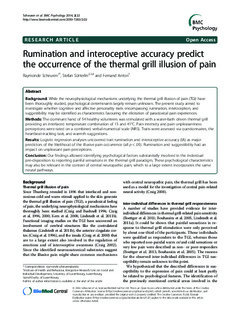Rumination and interoceptive accuracy predict the occurrence of the thermal grill illusion of pain
Journal article, Peer reviewed
Permanent lenke
http://hdl.handle.net/11250/277026Utgivelsesdato
2014Metadata
Vis full innførselSamlinger
Sammendrag
Background: While the neurophysiological mechanisms underlying the thermal grill illusion of pain (TGI) have
been thoroughly studied, psychological determinants largely remain unknown. The present study aimed to
investigate whether cognitive and affective personality traits encompassing rumination, interoception, and
suggestibility may be identified as characteristics favouring the elicitation of paradoxical pain experiences.
Methods: The dominant hand of 54 healthy volunteers was stimulated with a water-bath driven thermal grill
providing an interlaced temperature combination of 15 and 41°C. Pain intensity and pain unpleasantness
perceptions were rated on a combined verbal-numerical scale (NRS). Traits were assessed via questionnaires, the
heartbeat-tracking task, and warmth suggestions.
Results: Logistic regression analyses uncovered trait rumination and interoceptive accuracy (IA) as major
predictors of the likelihood of the illusive pain occurrence (all p < .05). Rumination and suggestibility had an
impact on unpleasant pain perceptions.
Conclusion: Our findings allowed identifying psychological factors substantially involved in the individual
pre-disposition to reporting painful sensations in the thermal grill paradigm. These psychological characteristics
may also be relevant in the context of central neuropathic pain, which to a large extent incorporates the same
neural pathways.

